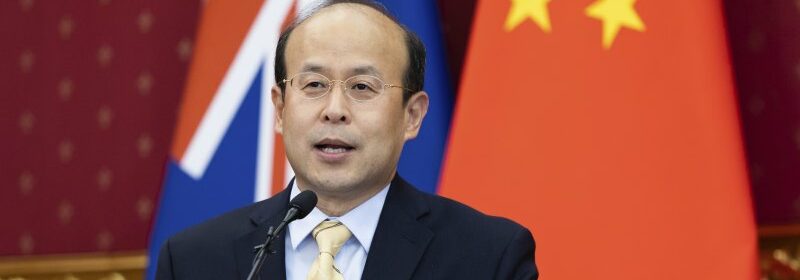Taiwan will be ours, but war with Australia is a fallacy

Recently, some commentators in Australia have confused right and wrong on the question of Taiwan, misled public opinion and again trumpeted the “China threat”, even concocting the fallacy that Australia will go to war against China. It’s time to set the record straight.
Taiwan is part of China’s territory. Taiwan has belonged to China since ancient times. Starting from the Song and Yuan dynasties, the imperial central governments of China all set up administrative bodies to exercise jurisdiction over Penghu and Taiwan.
Chinese Ambassador to Australia Xiao Qian.Credit:Alex Ellinghausen
In 1885, the Qing government officially established Taiwan as a single province, making it the 20th province of China at the time. In 1895, the defeated Qing government was forced to cede Taiwan and the Penghu Islands to Japan.
The Cairo Declaration issued by China, the United States and the United Kingdom in 1943 stated that it was the purpose of the three allies that all the territories Japan had stolen from China, such as Northeast China, Taiwan and the Penghu Islands, should be restored to China.
In 1945, the Chinese government announced it was resuming the exercise of sovereignty over Taiwan, and the ceremony to accept Japan’s surrender in Taiwan Province of the China war theatre of the Allied powers was held in Taibei (Taipei). From then on, China had recovered Taiwan de jure and de facto through a host of documents with international legal effect.
In 1949, the People’s Republic of China (PRC) was founded, becoming the successor to the Republic of China, and the Central People’s Government became the only legitimate government of the whole of China. The new government replaced the previous regime in a situation where China, as a subject under international law, did not change, and China’s sovereignty and inherent territory did not change.
As a natural result, the government of the PRC should enjoy and exercise China’s full sovereignty, which includes its sovereignty over Taiwan. As a result of the civil war in China and the interference of external forces, the two sides of the Taiwan Straits have fallen into a state of protracted political confrontation. But the sovereignty and territory of China have never been divided and will never be divided, and Taiwan’s status as part of China’s territory has never changed and will never be allowed to change.
China’s policy towards Taiwan is consistent and clear. In 1971, the United Nations General Assembly adopted Resolution 2758, making it clear there is but one China in the world, Taiwan is part of China, and the government of the People’s Republic of China is the sole legal government representing the whole of China.
This is the meaning of the one-China principle, which is at the very heart of China’s core interests. It is a red line that must not be crossed. It is also the political foundation on which China develops relations with other countries and the consensus of the international community.
National reunification by peaceful means is the first choice of the Chinese government in resolving the Taiwan question, as it best serves the interests of the Chinese nation as a whole, including our compatriots in Taiwan, and it works best for the long-term stability and development of China.
We will work with the greatest sincerity and exert our utmost efforts to strive for the prospect of peaceful reunification, and create a broad space for peaceful reunification, but we will not leave any room for any form of “Taiwan independence” separatist activities. To guard against external interference and all separatist activities, we will not renounce the use of force, and we reserve the option of taking all necessary measures.
The one-China principle is an important prerequisite and political foundation for improving, upholding and further developing China-Australia relations. Such a relationship should be built on mutual respect and trust. Both sides must adhere to issues of principle in politics.
The Taiwan question bears on China’s core interests, which brooks no foreign interference and allows no political manipulation.
At present, the China-Australia relationship is showing a positive momentum of stabilisation and improvement, and all sectors of the two countries generally wish to strengthen exchanges and cooperation. However, some individuals from the Australian side are using the Taiwan question as an excuse to make unfounded accusations and attacks against China and exaggerate the threat of war.
This is like Don Quixote tilting at windmills, fighting against a non-existent enemy. Such behaviour is even more detrimental to regional stability and Australia’s own interests.
I heard some insightful people in Australia say that China and Australia should respect each other, that the Taiwan question falls in the scope of China’s internal affairs, and that the “China threat theory” is groundless. I can’t agree more. China is not a threat to Australia. A war between China and Australia is neither realistic nor at all consistent with our national interests and diplomatic philosophy.
I want to emphasise that China-Australia relations are mutually beneficial. China’s high-quality development will bring more opportunities for the bilateral relations and for Australia. What Australia needs are opportunities and partners, not threats and imaginary enemies.
The Opinion newsletter is a weekly wrap of views that will challenge, champion and inform your own. Sign up here.
Most Viewed in World
From our partners
Source: Read Full Article
